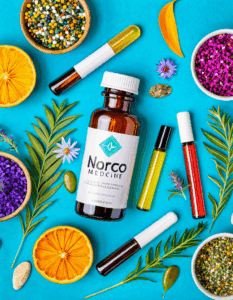In the soul-stirring journey of healing, open-ended recovery questions are not just a therapist’s tool; they are a beacon of light for those adrift in the sea of addiction. Words have the power to break barriers and open doors, and nowhere is this more evident than in the context of addiction recovery. Today, we delve into the art of asking—the kind of inquiring that ignites the human spirit and propels it toward healing. I invite you to explore how open-ended recovery questions can reshape not just recovery processes, but lives.

The Essence and Impact of Open-Ended Recovery Questions
At its core, open-ended recovery questions are inquiries that cannot be answered with a simple ‘yes’ or ‘no.’ They are the golden keys that unlock the depths of one’s psyche, fostering exploration, understanding, and growth. In the healing hands of counselors and therapists, these questions are the very catalysts that transform recovery into a journey of self-discovery.
Their force lies in their ability to inspire contemplation and to dig deeper than the surface. An addict might be asked, “What mistake have you made in the last week and how can you do it better in the future?” instantly catapulting them into self-reflection. Similarly, questions like “What were some of the early indications you were having difficulties?” help individuals map out the genesis of their struggles, while queries like “When you have a difficult day, what are three things you can do to make yourself content and/or happy?” promote the development of coping strategies.
Overcome Expanded Addiction Recovery Questions Group Therapy Game Cards Counseling Conversations Icebreaker for Substance Abuse, Positive Mental Health, Sobriety, Relapse &
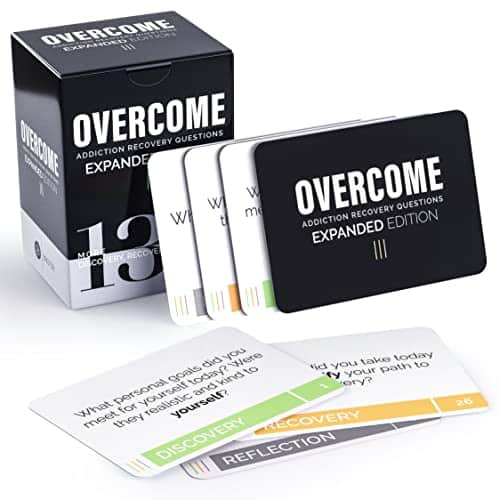
$29.99
Overcome Expanded Addiction Recovery Questions Group Therapy Game Cards are an innovative therapeutic tool designed to aid individuals on their journey toward recovery and positive mental health. This set of thoughtfully crafted cards serves as a powerful icebreaker for group therapy sessions, facilitating open communication and fostering a supportive community among participants. Each card presents a carefully formulated question or prompt aimed at encouraging self-reflection, dialogue, and personal growth. From addressing the challenges of substance abuse to discussing strategies for relapse and suicide prevention, these cards help break down barriers and promote meaningful conversations.
The game is not only beneficial for those seeking to maintain sobriety but also for therapists, counselors, and facilitators looking to stimulate engagement in a compassionate and non-threatening environment. The diverse range of questions ensures that every session is unique, catering to various aspects of the recovery process and helping participants to explore their feelings, fears, and aspirations. By enabling players to share their experiences and listen to others, the game promotes empathy and understanding within the group, which are vital components of successful addiction recovery.
In addition to being a valuable resource in support groups and rehabilitation programs, Overcome Expanded Addiction Recovery Questions Group Therapy Game Cards can be used in a variety of settings, including hospitals, outpatient clinics, and community centers. They are carefully designed to be inclusive and respectful, providing a safe space for individuals at all stages of recovery to connect and support each other. Whether it’s sparking a conversation about coping strategies or opening up about challenges with mental health, these game cards are a versatile and powerful aid in the fight against addiction and its associated struggles.
1. Fostering a Deeper Understanding of Self
Open-ended recovery questions are like silent heralds of self-awareness. They’re not about getting the ‘right’ answer, rather they’re about encouraging addicts to narrate their story, to find their voice amidst the chaos. Take, for instance, the stories echoed in support group halls, where an addict’s realization of their patterns often begins with a question posed by a counselor.
Real-life impact stories often share a common thread—an ‘aha’ moment or a revelation stemming from a thoughtful inquiry. Jack, a recovering alcoholic, credits his sober journey to questions like, “Who, what, where, when, why—there are questions to ask after a relapse,” posed to him after a stumble, prompting a revolution in his approach to sobriety.

| Focus Area | Open-Ended Recovery Questions | Purpose/Notes |
| Self-Reflection | What mistake have you made in the last week and how can you improve on it? | Encourages acknowledgment of mistakes and proactive planning for personal growth. |
| Ideal Support | If you could design your perfect support system, what would it entail? | Helps individuals envision and perhaps work towards their preferred support structure. |
| Coping Strategies | When facing a challenging day, what are three strategies that comfort you? | Identifies personal coping mechanisms for difficult times. |
| Relapse Prevention | What are the warning signs that indicate you’re struggling? | Raises awareness of personal triggers or early signs of relapse. |
| Reflection on Past | How would you describe yourself at your lowest point? | Encourages recognition of growth and the distance traveled in recovery. |
| Capabilities | What were you unable to do during your worst times that you can do now? | Highlights progress by contrasting past incapacities with current abilities. |
| Recovery Progress | What has most substantially helped you transition to where you are today? | Allows reflection on effective strategies or support that has facilitated recovery progress. |
| Preparing for the Future | What preparations can you make now to handle future difficulties better? | Promotes proactive planning and preparation for potential challenges ahead. |
2. Encouraging Expressiveness and Communication
Now, consider the closed-ended question’s distant cousin, the open-ended query. “Did you feel upset after the relapse?” pales in comparison to, “How did you feel after your relapse and what did you learn from it?” The latter opens the floodgates of introspection and dialogue, inviting the client to paint the canvas of their emotions with words.
Therapists often share their case studies, highlighting the remarkable difference open-ended probing makes in sessions. It’s this sort of prompting that turns a monologue into a conversation, carving a path for healing through shared narratives.

3. Building a Therapeutic Alliance Between Client and Counselor
Let’s not forget, the journey to recovery is often peppered with mistrust and apprehension. Open-ended questions are the olive branch—extending warmth and empathy. When counselors ask, “What couldn’t you do?” it not only nudges the client to introspect but also subtly reassures them that they are in a safe space.
Renowned experts like Dr. Julie Schwartz Gottman emphasize the vitality of such questions in nurturing a strong client-counselor relationship—a cornerstone for successful therapy.
Questions with Benefits Prompts Perfect for Date Night with Questions, Dares, and More
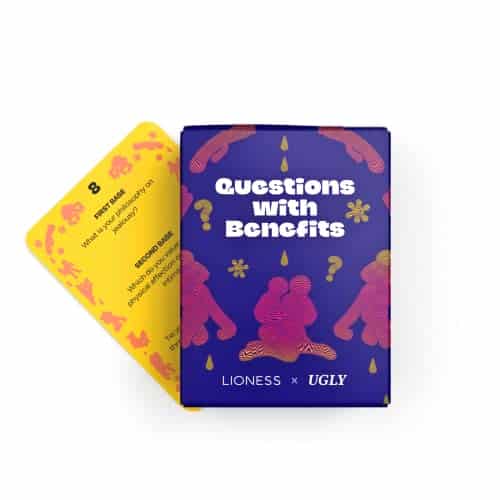
$19.99
Questions with Benefits is a thrilling card game designed to deepen the connection between partners while ensuring an exciting date night. The game offers a mix of thought-provoking questions, daring challenges, and playful prompts that foster communication, laughter, and intimacy. It provides a perfect balance of romance and adventure, making it an ideal choice for couples looking to break the ice, rekindle the spark, or simply spend quality time together. Every card is crafted to engage both parties in meaningful and entertaining interactions that go beyond the surface level.
The deck features different categories tailored to suit various moods and preferences, ensuring that no two game nights are ever the same. Couples can explore each other’s desires, fears, and fantasies in a safe and lighthearted environment, pushing boundaries only as far as they feel comfortable. Whether it’s sharing a secret, performing a romantic dare, or engaging in a deep conversation about life goals, Questions with Benefits turns every question and task into an opportunity for bonding. The game is easy to play and requires no prior preparation, making it a spontaneous addition to any date night.
Apart from sparking joy and promoting closeness, Questions with Benefits also serves as a tool for personal growth within the relationship. It encourages partners to listen actively and express themselves honestly, which can help resolve underlying tensions and enhance mutual understanding. The varied content, which ranges from light-hearted and humorous to emotional and serious, caters to different stages of a relationship, whether you’ve just started dating or have been together for years. Grab your deck of Questions with Benefits, and transform your date night into an unforgettable journey of discovery and fun.
4. Empowering Personalized Recovery Pathways
Just like a tailor’s peplum creation Enhances uniqueness, open-ended questions celebrate the individuality of each recovery journey. The utility in therapy is akin to choosing a bespoke suit over a one-size-fits-all jacket. It’s the understanding that although addiction may have commonalities, each person’s battle and victory are their own.
Institutions like the Hazelden Betty Ford Foundation have borne witness to countless stories of recovery, attributing much of their success to the personalized approach that open-ended inquiries facilitate.

5. Uncovering Hidden Obstacles and Revelations in Recovery
These questions are the archaeologist’s brush, gently revealing the buried treasures and trials within an individual’s psyche. “What helped you move from where you were to where you are now?” is not just a question—it’s a journey through time that allows the individual to recognize their obstacles and victories.
Therapists across the globe collect anecdotes where a single open-ended question has led to epiphanies, altering the course of a client’s recovery entirely.
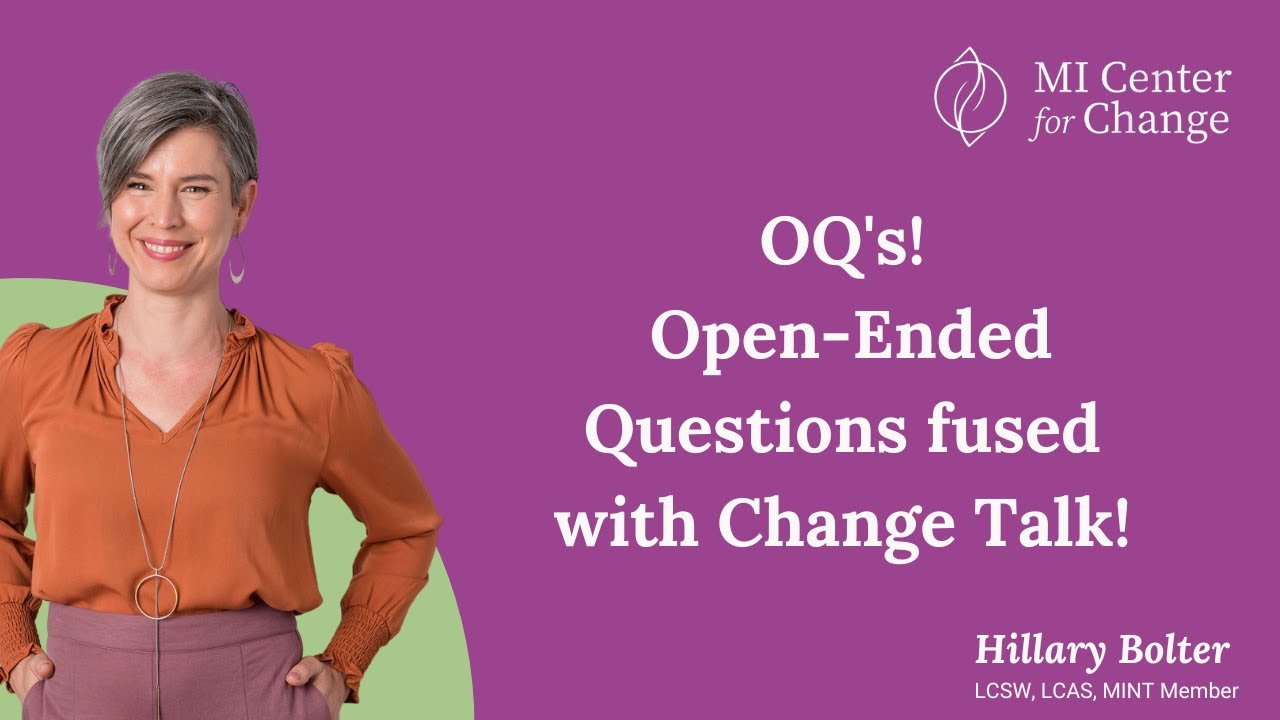
6. Facilitating Accountability and Ownership of Recovery Journey
Accountability isn’t just about answering to someone; it’s about owning one’s story. Open-ended questions inherently encourage this. They are less of an interrogation and more of a guided self-exploration. In communities like SMART Recovery, it’s these narratives of personal accountability, prompted by probing questions, that echo triumph and resilience.
BENCMATE Protective Inflatable Collar for Dogs and Cats Soft Pet Recovery Collar Does Not Block Vision E Collar (Large, Flag)
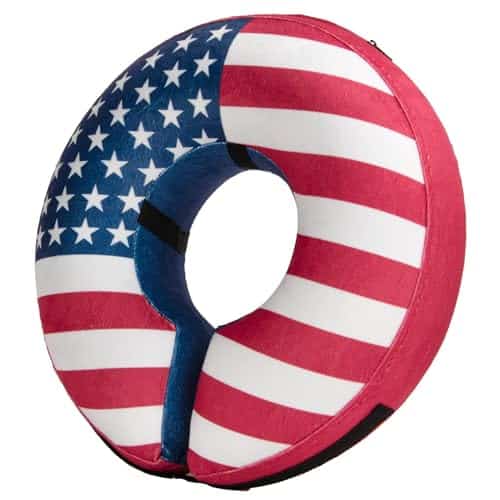
$17.07
The BENCMATE Protective Inflatable Collar for Dogs and Cats is a vet-recommended solution for pets recovering from surgeries or wounds. Its design is thoughtfully intended to prevent animals from biting or licking their injuries, facilitating a quicker healing process. Unlike traditional E-collars, this soft recovery collar does not obstruct your pet’s peripheral vision, allowing them to eat, sleep, and play without additional stress. The inflatable collar comes in a large size, adorned with a fun and patriotic flag pattern that not only ensures comfort but also adds a touch of style to your pet’s recovery wear.
Crafted from a durable and lightweight material, the BENCMATE Protective Collar offers a blend of convenience and comfort for both pets and their owners. It is easy to inflate and deflates for compact storage when not in use, and the scratch and bite-resistant fabric ensures longevity. The soft outer material is comfortable against your pet’s neck, and the adjustable strap provides a secure and customizable fit to accommodate different breeds and sizes. Furthermore, the collar is washable, which means it remains hygienic throughout the recovery period.
Equipping your furry friend with the BENCMATE Protective Inflatable Collar affords them the mobility and comfort they need during their convalescence. The ingenious design allows pets to retain their full range of motion, making the healing process less daunting and more bearable. This Soft Pet Recovery Collar is an excellent alternative to the traditional cone, effectively preserving your pet’s spirits while safeguarding their health. Pet owners can rest easy knowing their beloved companions can heal without feeling hindered by their protective gear.
7. Enabling Continuous Assessment and Realignment of Recovery Goals
Recovery is not static; it’s a continuum. As one’s journey evolves, so too must their goals and strategies. Open-ended questions are essential for this recalibration. They serve as checkpoints where an addict can examine their progress and adjust their sails. Addiction specialists wax lyrical about the importance of such flexibility facilitated through thoughtful inquiry.

The Invaluable Role of Open-Ended Recovery Questions in Long-term Success
Armed with open-ended questions, therapists can help steer recovery from fragile sobriety to robust, sustained wellness. Longitudinal research attests to the efficacy of open questioning techniques in maintaining long-term recovery, rooting for the profound impact these conversations have on personal growth.
The science is clear: when individuals engage with open-ended recovery questions, they’re not just answering a therapist—they’re conversing with their souls.
Conclusion: The Transformative Journey Through Open-Ended Inquiry
From uncovering the stories that bind us to our addictions to weaving the narratives of our future selves, open-ended recovery questions are a pivotal element in the tapestry of recovery. They go beyond mere words; they’re the compass that guides, the mirror that reflects, and the bridge that connects.
As we continue to explore these avenues, the horizon for therapy expands, promising a future where every question asked opens a door to a world waiting to be discovered, understood, and healed. To continue the conversation, or if you’re looking for a lifeline in times of turmoil, the Mothers Against friendship hotline is just a heartbeat away. For those curious about how to articulate their concern and love through questions, delve into the soulful art of engaging with a loved one with resources like open-ended Questions about drug abuse and Questions To ask a drug addict, and begin a healing dialogue today.
Discover the Amazing Perks of Open-Ended Recovery Questions
Trivia and interesting facts, you say? Well, hold onto your hats because we’re diving into the wildly beneficial world of open-ended recovery questions. Now, these aren’t just any old queries; they’re like the MVPs of conversations, hitting home runs in the heart-to-heart league much like those unforgettable moments at an Indians game. Get ready to have your mind blown by the insane advantages they bring to the table!
The “Get to Know Ya” Champion
First off, open-ended recovery questions are the champs at getting folks to open up. It’s like having a heart-to-heart where you’re the star player, listening to the in-depth stories that make everyone unique. These questions roll out the red carpet for answers that are as unexpected as the plot twist in sonic The hedgehog 3, letting people share the good, the bad, and everything in between.
Unravel the Mystery with Style
Picture this: recovery questions are your trusty sidekick in the battle against vague responses. They’re like a detective in a mystery novel, teasing out the details that would otherwise stay hidden. Ever listened to Madison Beer’s songs and thought “Wow, madison beer hot tracks really get me thinking”? That’s exactly what open-ended questions do in therapy!
A Spill-Your-Guts Invitation
Ever noticed how a comfortable and stylish rug invites you to kick off your shoes and relax? That’s what Ruggable Rugs do for your feet, and open-ended recovery questions do the same for someone’s thoughts. They’re an open invitation to spill your guts, without the fear of a stain on your psyche—they’ve got you covered!
The Empathy Builder
Another crazy benefit? Empathy levels shoot through the roof! When you ask open-ended questions, you’re basically saying, “Your story matters to me, spill the tea.” It’s like making a friend on the first day of school because you’re genuinely curious about their summer vacation. It’s not just about nodding along; you’re digging deeper, and that’s where the magic happens.
The Bonding Glue
And speaking of making friends, open-ended recovery questions are the ultimate glue in the puzzle of human connection. By encouraging folks to share their experiences, you’re not just passing the ball back and forth – you’re playing a whole new ball game.
Ditch the Script
You know what else? These questions throw the boring, predictable script out the window. They’re spontaneous, much like an ad-lib in a comedy sketch – you never know where the conversation will go, but you’re guaranteed a chuckle or two along the way. Plus, they make you look like a great conversationalist, even if you’re feeling as nervous as a long-tailed cat in a room full of rocking chairs.
The Ultimate Icebreaker
Lastly, open-ended recovery questions are like the Swiss Army knife of social tools – they can be the ultimate icebreaker. Whether you’re trying to melt tension in the room or just warm up a chilly chat, these queries can turn an awkward silence into a symphony of dialogue.
So there you have it, folks – seven insane benefits of wielding the mighty power of open-ended recovery questions, wrapped up in one neat, trivia-packed package. Use them wisely, and watch the magic unfold in your conversations!
Courage to Change Recovery Journal Empowering your path to transformation with Soothing slogans, Personal Inventory Questions, Anxiety Relieving Journaling Practices, & Suppor
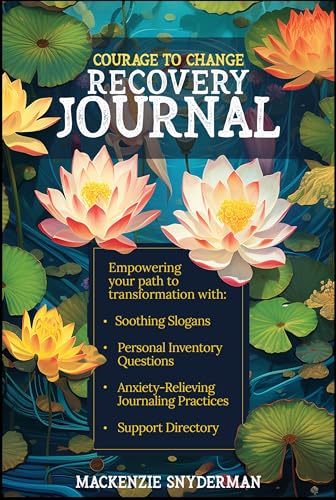
$9.99
The “Courage to Change Recovery Journal” is a guiding light on the road to personal growth and recovery for individuals seeking to overcome life’s challenges and foster a profound personal transformation. Thoughtfully crafted with soothing slogans, each page offers words of wisdom and affirmation to inspire resilience and courage on tougher days. The journal blends motivational quotes with personal inventory questions to help users reflect on their journey, recognize their strengths and weaknesses, and understand the depth of their emotions and experiences. This introspective approach is designed to encourage users as they navigate the tumultuous waters of change towards a more hopeful, self-aware future.
Delving deeper, the journal incorporates anxiety-relieving journaling practices that serve as therapeutic tools to calm the mind and soothe the soul. These guided journaling exercises are carefully designed to address common stressors and triggers, providing a creative outlet for expressing feelings and fears that may otherwise go unspoken. By giving a voice to inner turmoil, the journal helps in dismantling the power of anxieties and facilitates a more mindful and tranquil recovery process. This personalized method of self-expression is a critical component in fostering mental health and building emotional resilience.
Support is a key element in the journey of transformation, and the “Courage to Change Recovery Journal” acknowledges this by including a comprehensive directory of support resources. Whether users need to connect with local support groups, seek professional help, or simply find an understanding community, this directory offers essential contact information and guidance. This sense of connection is integral to the journal’s mission to empower users to not only work through their recovery independently but also to recognize the value of seeking and accepting help along the way. In essence, this journal is more than just a bookit’s a companion for those committed to change, providing them with the tools and resources needed at every stage of their healing journey.
What are open ended questions for recovery groups?
Open-ended questions for recovery groups are a real game-changer, aren’t they? They get the conversation flowing like nobody’s business. Questions like “How has your perspective on life changed since starting recovery?” or “What coping strategies have been a slam dunk for you?” can nudge folks to dive deeper into their experiences and share more of their journey.
What are some fun questions to ask in recovery?
Looking to spice things up in recovery? Fun questions can be just the ticket! Try asking, “If your recovery journey was a movie, what genre would it be?” or “What’s the most unexpected hobby you’ve picked up in recovery?” These playful queries can help lighten the mood and bring smiles all around.
What are the 5 W’s in recovery?
Ah, the whodunit of recovery! The 5 W’s—Who, What, When, Where, and Why—can serve as a guide. For example, “Who has supported you the most in your recovery?”, “What major obstacles have you overcome?”, “When did you realize you were making progress?”, “Where do you find peace in tough times?”, and “Why did you choose to seek help?”, help folks reflect and explore the many facets of their healing process.
What are the questions on the recovery story?
When crafting a recovery story, it’s like you’re the author of your own comeback tale. Questions to ask include ones such as “What led to your decision to recover?”, “How did your lowest point shape you?”, “What triumphs have you celebrated along the way?”, and “What dreams are you chasing now?” It’s like an open book for each person to fill.
What are fun check in questions for group therapy?
Kick off group therapy with a dash of fun—check-in questions should be a hoot! “What’s one thing that made you laugh this week?” or “If you were a superhero in the battle of recovery, what would your powers be?” can break the ice and get folks warmed up quicker than a cup of hot cocoa in December.
What are good icebreaker questions for therapy?
Breaking the ice can be tricky, eh? Good icebreaker questions should not be snoozers. Try, “What’s a quirky fact about you that no one would guess?” or “What was your last ‘aha!’ moment?” These questions can slice through the awkwardness like a hot knife through butter and get people gabbing.
What are the 5 questions to ask?
Ever feel like you hit the jackpot with just the right questions? Well, the 5 questions to ask might be just what you’re looking for. They include: “What’s your proudest moment?”, “How do you bounce back after a setback?”, “What’s something you’ve learned recently?”, “Who or what inspires you?”, and “What goals are you working toward?” They can really open doors to meaningful convos.
What is a recovery question?
You know, a recovery question can pack a punch all on its own—it’s the key that could unlock someone’s potential. It goes something like, “What steps are you taking to strengthen your recovery today?” This question gets straight to the heart of the matter and encourages proactive thinking.
What is a cool question to ask?
Wanna ask something that’s cool as a cucumber? Try, “If you could have dinner with any figure from history, who would it be and why?” This question is a winner, drawing out interesting conversations and giving everyone a slice of fun insight into personalities.
What are the 3 R’s of recovery?
“Reduce, Reuse, Recycle” aren’t just the 3 R’s of sustainability—they’re also about recovery! In this context, think about Reducing stress and negative influences, Reusing strategies that work for you, and Recycling your experiences to help others. It’s pretty nifty how well this fits, don’t you think?
What are the three P’s in smart recovery?
The three P’s in SMART Recovery really know how to set the stage: Patience, because good things take time; Practice, ’cause let’s be real, it ain’t gonna happen overnight; and Perseverance, to keep pushin’ through the tough times.
What are the three priorities of recovery?
When it comes to recovery, there’s no messing around with priorities. Three biggies are Health (putting yourself first to heal up), Support (surrounding yourself with folks who have your back), and Purpose (finding the drive that keeps you chugging along).
What are the four truths of recovery?
The four truths of recovery spill the tea on what it’s really about. It’s Recognizing there’s a problem, Facing the facts without sugar-coating, Embracing change despite it being as comfy as a bed of nails, and Committing to the process, come rain or shine.
What are the two pillars of recovery?
The two pillars of recovery stand tall like the strongest of oaks. One is Support, because let’s face it, we all need a cheer squad from time to time. And the other? Change, because nothing grows in stagnant water. Together, they hold up the entire show.
What makes a good recovery?
What’s cooking in a good recovery? It’s got the right blend of determination and flexibility—kinda like being a reed in the wind, standing strong but bending when necessary. It’s personal, like your favorite coffee order, and it’s built day by day, like a house of bricks. And hey, a dollop of hope never hurts!
What are 3 examples of open-ended questions?
Who loves open-ended questions? Well, most folks in recovery do—because they let ’em paint outside the lines. Questions such as “What do you value most nowadays?”, “How has your journey influenced your relationships?”, and “In what ways are you challenging yourself?” These are wide open for deep answers.
What are open-ended and closed ended questions in therapy?
Open-ended vs. closed-ended questions? It’s like the difference between a buffet and a pre-packed lunch. Open-ended ones, like “What thoughts have been on your mind this week?”, leave room for a personal touch, while closed-ended ones, such as “Did you attend your meeting today?” only require a simple yes or no. Both have their place at the table, though!
Why are open-ended questions important in group therapy?
The magic of open-ended questions in group therapy? They pass the mic and let each person drop their own beats. Everyone’s story gets the spotlight, no interruptions. These questions push the conversation beyond the “yes” or “no,” making space for growth, healing, and who knows—maybe even a few “aha!” moments along the way.








